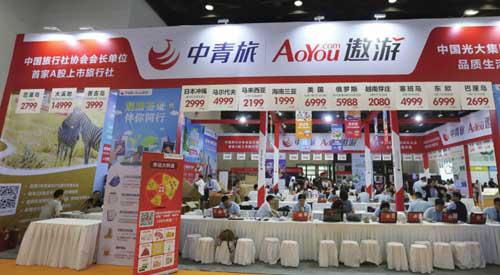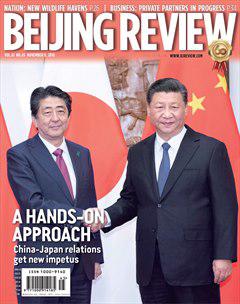Spreading Wings
By Deng Yaqing
At a wine party, as Wang Guangying walked up to the dais, he faced an audience of business magnates, foreign dignitaries and government offi cials. It was a momentous occasion in Hong Kong. Wang was going to announce the launch of a Chinese mainlandfunded trade and industrial investment company, a rare move at that time, making him a pioneer in Chinas bold attempt to open up to the outside world.
The year was 1983, just five years after China adopted the policy of reform and opening up. At that time, it had a fledgling economy, was weak in overall national strength and lagged in technological development. Therefore, there was an urgent need to step up interaction and cooperation with the rest of the world.
Thirty-five years later, the trade and in- dustry company has grown into a financial holding giant—the China Everbright Group. This year, the conglomerate ranked 322nd on the Fortune 500 list.
At a gathering in Beijing in August, the seventh helmsman of the company, its Chairman Li Xiaopeng, celebrated Everbrights 35th anniversary with his staff from every part of the country. “To pursue high-quality development, we will further refine financial services, improve industrial development and foster the groups synergy,” Li said. The goal, he stressed, was to build the company into a world-class fi nancial holding group.
Everbright, which has become an important window to China to the outside world, has a significant role in helping the nation access more foreign investment and ad- vanced technology. In the 1990s, it formed a fundamental business model, prioritizing finance while promoting tie-ups between fi nance and industry.
By the end of September 2018, Everbrights assets were worth 4.76 trillion yuan ($682.9 billion), up 6.6 percent from the beginning of the year. The operating revenue surged up 21.3 percent year on year, while net profit increased by 6.8 percent, compared with the same period last year.
Ambitious roadmap
Wading through two rounds of reform and reorganization in the past decades, Everbright has now stepped out of its comfort zone. From its traditional financial domain of banking, securities, insurance, as well as funds, assets and investment management, it has entered environmental protection, tourism and healthcare industries. Confronted with a complicated external environment and increasingly fierce competition, the company has worked out an ambitious roadmap to join the ranks of the top fi nancial holdings around the world.
At a meeting in February, its executives put forward a two-step strategy. In the first phase, from 2018 to 2023, the focus is on building Everbright into a domestic fi rst-class financial holding group with a global reputation. In the second phase, from 2023 to 2028, it will aim to be a global leader.
“To build a world-leading conglomerate, a cluster of excellent companies that can take a lead in their respective industries needs to be established in the next fi ve to 10 years,” Li said.
Four subsidiary companies, engaged in environmental services, tourism, cross-border assets management and aircraft leasing, are targeting to become global frontrunners. Three subordinate companies specializing in trusts, commercial banking and investment banking are eyeing the top echelon in the domestic market. In addition, healthcare, life insurance and industrial investment companies will develop their specialties.
The 19th National Congress of the Communist Party of China in October 2017 launched the initiatives of building a Beautiful China and a Healthy China as well as innovation-driven development. Everbrights longterm development planning is inspired by the initiatives.
“We have taken national strategies into account when programming the companys future because opportunities consist of serving peoples demands,” said Li, who has prioritized environmental protection, tourism services, healthcare and new technology in Everbrights businesses.
The companys environmental protection arm Everbright International has experienced rapid business growth. Currently, it has 106 waste-to-energy projects on the Chinese mainland. With their total annual treatment capacity exceeding 32 million tons, Everbright International ranks fi rst in Asia.
In January, two state-owned enterprises, travel agency China CYTS Tours Holding Co. and pharmaceutical retailer Cachet Pharmaceutical Co., became part of the Everbright stable of companies and its main force to roll out tourism and healthcare services in the long term.
At a press conference held by China CYTS on September 21, Li said Everbright would mobilize capital and resources to support the implementation of Chinas rural vitalization strategy. The company will develop rural tourism, promote waste-to-energy projects, and accelerate eco-environmental protection programs.
In the next five years, Everbright plans to build 100 special tourism projects, 400 bio-toilets in rural areas, 200 rural-urban waste-to-energy projects, and 100 sewage treatment, hazardous waste disposal and soil remediation projects.
Crossing borders
Since President Xi Jinping proposed the Belt and Road Initiative five years ago, Chinese companies have launched numerous projects in countries along the routes of the Silk Road Economic Belt and the 21st-Century Maritime Silk Road.
At the opening ceremony of the 2018 Boao Forum for Asia annual conference in south Chinas Hainan Province on April 10, Xi reiterated that the door of Chinas opening up will not be closed but will only become wider and wider.
“Born in Hong Kong, Everbright should keep a foothold on the Chinese mainland, tap into the Hong Kong market, and expand its business in the rest of the world, Chinas neighboring countries in particular,” Li said, adding that Everbright is trying to open up potential markets along the Belt and Road routes.
Everbright Internationals overseas business footprint has expanded to Viet Nam, Germany and Poland. Waste-to-energy projects can not only turn waste into wealth, create jobs and fuel up local economic development, they can also help preserve the beautiful natural environment of their host countries, Li told China Central Television during Xis visit to the United Arab Emirates in July.
Everbrights tourism and financial businesses are coordinating resources on the Chinese mainland and in Hong Kong to go global. The company plans to establish a cross-border financial service platform and an overseas financing platform. It will also explore opportunities in cross-border assets management, environmental protection and banking to forge an international network of services.
At Everbrights 35th anniversary party, Li looked back at the road the company has traveled and the transformations it has undergone. “No matter how far the destination, we will get there as long as we have a will,”he said.

